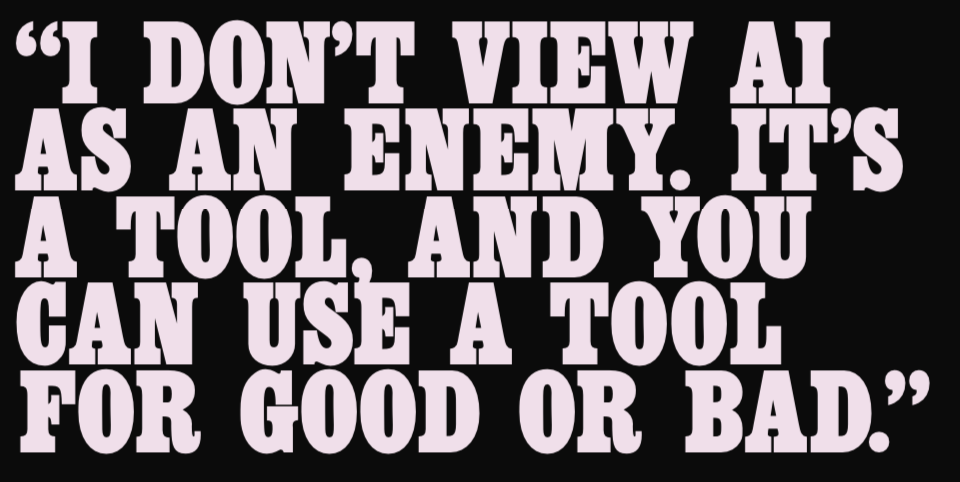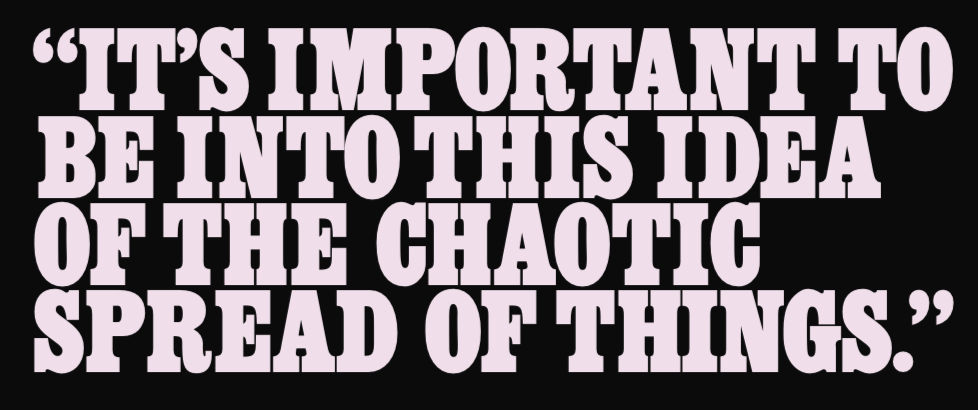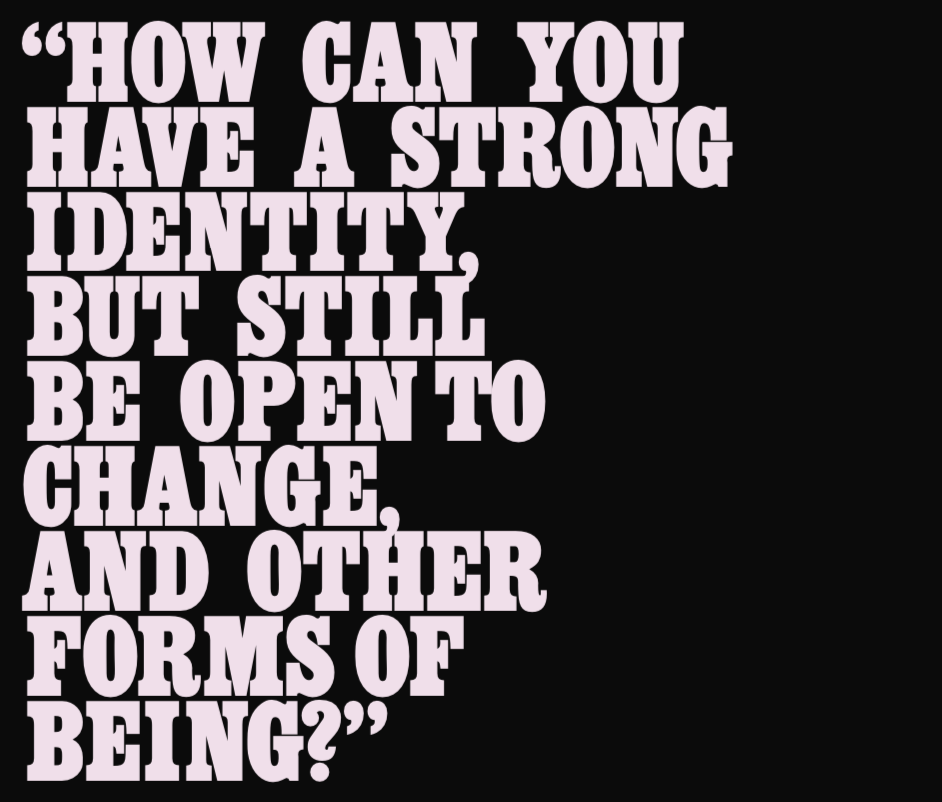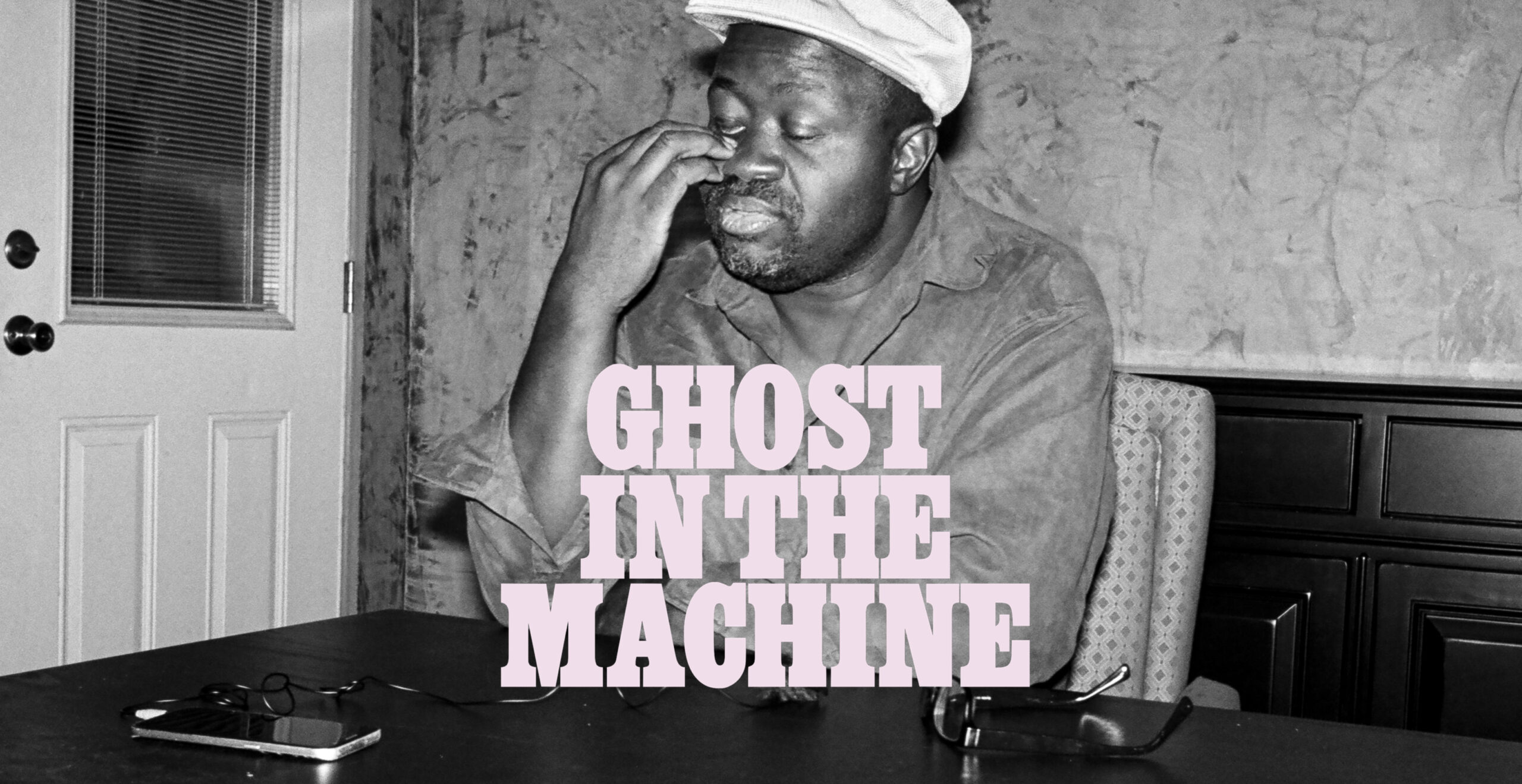Header image: CORNELIUS HARRIS by JONATHAN FORSYTHE in Talking to Americans, Jonathan Forsythe & Thomas Venker, 2020
At a time when the call for racial justice has sounded more loudly than at any point in recent memory, CORNELIUS HARRIS of Detroit techno label Underground Resistance talks to rising Chinese artist LAWRENCE LEK about what the legacies of Afrofuturism and Sinofuturism mean for us today.
Humanism is great and all—that is, if you’re a part of it. Throughout the majority of Western thought, liberal humanism—an approach to life that supposedly rests on morality and common humanity—has only been afforded to a select few (often white), and used as a justification for some to overpower others. The past two years saw flashpoint moments in racial violence, like the resurgence of Black Lives Matter following the murder of George Floyd, and the Stop Asian Hate movement responding to the global surge in violence against Asians during COVID. In both cases, Black and Asian bodies were coded as the ‘other’—non-human beings to be irrationally feared or dominated.
But the master’s tools will never dismantle the master’s house. On the outset, marginalised bodies might try to prove their humanity and legitimacy, though radical cultural movements such as Afrofuturism and Sinofuturism have since gone the other direction, embracing their racialised status as ‘other’.
Since the ‘80s, Detroit’s Underground Resistance label has put out some of the most legendary Afrofuturist records in the history of techno, including the likes of Jeff Mills and Drexciya. Cornelius Harris—the manager of the label (which he describes as a “collective”)—has worked closely with the imprint’s co-founder Mike Banks to draft narratives around their artists of aliens, viruses, and underwater civilisations—descendents from the pregnant Black slaves who were thrown or jumped overboard during the Middle Passage.
In the past decade, Malaysian Chinese artist Lawrence Lek developed a model of what he calls Sinofuturism, proposing Chinese science fiction mythologies that use both Afrofuturism and Italian Futurism as departure points. “Rather than resisting stereotypes, Sinofuturism embraces cliches,” he writes in a video essay titled Sinofuturism (1839–2046 AD) (2016).
This speaks to contemporary paranoias that AI robots will take over the world, replace labour, and render human brains obsolete with quantum computing power. Uncoincidentally, Lek noticed these paranoias as similar to popular xenophobia against the Chinese: the fear of rising China and its superhuman labour. In his videos, he asks the question: how can we imagine a subjecthood articulated from a vantage point of the other—the AI? At work here is a fiction that rejects the dominant strain of liberal humanism, with its emphasis on the soul, by identifying with AI—which either is or isn’t dystopian, depending on whose world you think is ending and whose is just beginning.
Clearly, our contemporary moment demands new ways of thinking about race, and COVID has only exacerbated that need. Here, Harris and Lek together discuss the Black Lives Matter and Stop Asian Hate movements, and how culture—historical and contemporary—can be used as an answer towards racial justice.

CORNELIUS HARRIS: When you say Sinofuturism, it seems very specific to one particular group, whereas one of the central things about Afrofuturism is how it speaks from a collective diaspora. Why did you take that approach versus looking at this broader Asian-futurist idea?
LAWRENCE LEK: The short answer is because I know what it is to be Chinese much more than I know what it is to be Korean, or Japanese, or Vietnamese, or from Bhutan. I didn’t feel I had enough personal awareness to claim what would be called ‘East Asian Futurism’. One of the clichéd narratives is that we all look the same, and there are huge problems within that. I’d read quite a lot about Afrofuturism, Drexciya, both sonic and science fiction, and I was just amazed. I asked myself why the same playful reclamation of cultural space didn’t exist in terms of Chinese futurism.
If we look at science fiction films of the ‘40s and ‘50s, racism is basically written into the script. You have The Creature from the Black Lagoon (1954) dragging people away into the dark waters. You have Flash Gordon (1980) with the villain in yellowface. So there’s a lack of agency for the ‘other’ in the narrative—and I’m not even talking about representation, because of course, whitewashing and retelling other cultural stories is part and parcel of mainstream entertainment. That’s not the problem I’m dealing with. I’m interested in reclaiming this idea of technology for the future.
CH: How so?
LL: Looking at what African American practitioners had done in the ‘70s, ‘80s, ‘90s, and 2000s, I was thinking, how do the portrayals of that aspect of Black history differ from this aspect of Chinese history? And how does that intersect with the diaspora in terms of forced migration, voluntary migration, and slavery? I was thinking about this idea of how the superhuman being exists in different kinds of science fiction: you have a kind of ‘colonial-saviour-taming-the-wild’ mentality, or you have space colonisation. I was wondering what the ideal symbol of Sinofuturist mythology could be—the equivalent of what superhuman aquatic underwater species are to some Afrofuturist imaginaries.
At the time, I was making a film about an AI satellite in Asia becoming self-conscious [Geomancer (2017)] and I was literally searching ‘China AI’ on YouTube. The results fell into two completely polarised ways of talking about the same subject. Essentially, it’s either going to destroy the universe or save it. What fascinated me was how Infowars and Fox, for example, talked about China in exactly the same way as they talked about AI—either they’re gonna take our jobs, work for no money, or work in these inhumane conditions, and so on. It was uncanny to see this. So basically, I thought that the ideal mythological Sinofuturist avatar is AI, because it works endlessly, doesn’t need to rest, consumes all amounts of data, has no capacity for emotion, and treats ethical questions without any humanist qualities.
CH: What I see a lot of is fetishisation, in particular of Japanese culture. Then I see that applied towards everyone of Asian descent, because in the West, I think people can’t tell the difference [laughs]. You’ve got people who think Africa is a country and can’t wrap their heads around the fact that there are 54 different countries on a continent with thousands of different languages, cultures, and histories. The largest non-African American population we have here in Detroit, in terms of diaspora, is Caribbean, but within the Caribbean, you’ve got all of these different cultures and people. There was a restaurant here that referenced Jamaica even though the actual owners were from Trinidad. They said that since nobody knows anything about Trinidad, they just called it Jamaican. It’s become important to recognise that these things are impacting all of us, regardless of who we are, you know, who we actually are, where we’re actually from, or what our histories are.
LL: Even though it’s prefixed with ‘sino’ in the video itself, because of the way that global production of technology, manufacturing and flows work, ‘sino’ involves everyone. Everyone’s implicated. In my initial YouTube search, China is viewed as a threat. At this current world-historical moment in the West, China is viewed the same way the Middle East had been, or before that, Russia. I don’t know how reporting on pandemic stuff has been in the States, but it’s probably not been that favourable to different ways of tackling the situation around the world.
CH: It’s been pretty awful. I think it plays into those broader stereotypes. There’s been a lot of talk recently about attacks on Asian Americans. It’s not specific to any particular group. We recently had the anniversary of the death of a young man here in Detroit, Vincent Chin, who was murdered by two white bottle workers, who basically said that they killed him because they thought he was Japanese.

LAWRENCE LEK by ILYES GRIYEB, courtesy Art Basel
LL: Wasn’t that because a Japanese car company was buying up the plot or something like that?
CH: In manufacturing, you have this built-in obsolescence. Set up the cars to fall apart faster and faster, to try to drive more sales. Then you had Japanese companies designing more fuel efficient cars. They didn’t fall apart, so they really quickly dominated the auto industry. This whole thing of ‘Japanese companies taking over’ was built around racism that went back to World War II. People even tried to make it out like: here’s this Japanese enemy attacking the US. There were situations where if you were driving a Japanese car, you might get vandalised, your tyre slashed and things like that. There were actual attacks on people driving these cars. These guys bought into this narrative, and they took that out on Chin. It was really motivated by hate.
This is where I think futurism becomes important. Someone once referenced to me—and I think this is brilliant—that Afrofuturism started the moment the first African in chains came here. It was always this thing of asking, how do I move away from this? How can I envision a future where this isn’t the norm? Because if I take this to be what it’s going to be like for all of eternity, then forget it. The thing that sustains people is being able to envision a different future. Mike [Banks, from Underground Resistance] said once that you do work now for the future.
LL: One thing I thought in terms of planting seeds for the future in science fiction—or just culture—in general—is this idea of an unknown audience. Let’s say you make something in the present, you don’t know who’s going to pick it up, listen to it, watch it, or read it in the future. It’s such an obvious thing, especially with books. So many of these authors are dead. They have no idea that I’m reading them, that they inspired me, that they motivate me, and that I’m going to write or do something because of that.
When you’re in the present, you’re so caught up in superficial questions, like who’s writing today, is my record gonna sell, whatever, and you don’t think of that unknown audience. That’s an important point that I’d like to talk more about. How things like music labels and publishing houses, to some extent, are bringing the past as an archive into the present. It happens all the time in different media, like a remake compilation. It can be seen as a horrible, neoliberal cashing in on the past, but it does serve an important function to recontextualise things for a new generation.
CH: The cool thing about music, on my side of it, is when music comes out, and then someone from Mongolia or somewhere hits you up, and they’re like, ‘I love it!’ It’s like, how the hell do you know about this? There’s a distributor we work closely with in Japan. He said that Juan Atkins is the reason he met his wife. He was in London when Juan was playing, and he was like, ‘what is this Japanese woman doing here?’ He starts talking to her and eventually, they get married, and open up the distribution company.
So for anyone who does any kind of DJ set or show or performance, you have no idea who’s watching or listening. You have no idea who it’s bringing together, and what connections are coming from that. And I think that’s beautiful.

LL: It’s important to be into this idea of the chaotic spread of things. I released this soundtrack last year [AIDOL OST (2020)], so I get monthly updates from Spotify, right? What is hilarious is although I’m like a nano-scale artist on Spotify, they just send me the same emails that they send to their top influencers. For example, they’re like, ‘Your December was full of high notes, you’ve got twelve new listeners!’ It’s almost comedy. It’s like, I don’t want to know, it doesn’t make any difference to me. I just hope that somebody cares.
But somehow, it ties into this idea that the streaming algorithm really changes what it means to listen. I grew up going to record stores and searching things out, with this idea of music as a niche product. Before you would have more traditional genres and categories, whereas now it’s micro genres of mood and tempo and style and all the rest of it. Personally, I prefer a chaotic approach to listening history. So my YouTube and SoundCloud algorithms are completely screwed up. I just get the most random stuff, and I kind of like it that way. For me, that’s how music discovery works. How do you discover music today?
CH: I use Spotify a lot. I used to be so anti-Spotify, and now I’m on it. I’ll find a random song, and go to the song radio or whatever. That allows me to hear a lot of stuff that I wouldn’t have heard otherwise, and get exposed to some different things. And, you know, it’s an algorithm. But, looking at technology, all these things are tools. I don’t view AI as an enemy, per se. It’s a tool and you can use a tool for good stuff or bad stuff. It depends how you use it.
LL: There’s sometimes a widespread belief or assumption that because science, and especially computer science, doesn’t involve human gestures, the same kind of rules of creativity don’t apply. I always just think about how different the paradigms are. For example, I’ve played guitar since I was a teenager. But over coronavirus, I was like, ‘why don’t I get some hardware synths and mess around with that a little bit?’ And obviously, I record stuff in Ableton and loop things, but it was the first time I realised the difference in composition, or playing between a loop, and an instrument. When you have a synth, you press play, and the machine plays itself, you’re just guiding it on its way—steering it left or right, taking things out, putting things back in. It’s such a fundamentally different way of being or thinking than when I’m playing guitar.
In terms of musical composition, it made me think: I don’t have to be responsible for all the elements that are happening in the here and now. That completely changed my mindset. I’m just there. I’m a machine operator. You see this in old Yellow Magic Orchestra clips. They’ve got the hallmarks of a band, but actually, the machines are playing themselves. And of course, Kraftwerk is a similar thing. They could basically be at the motor factory, just making sure that everything’s running smoothly.

CH: It’s like a film director. You’ve got all these elements, you’re putting it together and giving it a direction. Or like a conductor. You’re not actually playing the instruments, but you are guiding it. There are all kinds of different choices being made. So this final piece of whatever it might be is the result of these choices. It’s like a Choose Your Own Adventure type thing. I think that’s the key: even though the AI is doing this—and again, a sampler is like a rudimentary AI—you’re telling it to do something. It does it over and over, but you are guiding that. That guidance is what makes it cool, because it points to more of a collaborative dynamic than anything else. Your partner is the sampler.
LL: In some cases, the partnership of the human and AI player is stronger than each of them individually. They compensate for each other’s weaknesses in a way. Humans are better at judging things by ear, and machines are better at playing exactly the same thing, or the exact same variations in the same kind of way. I was doing a lot of research into AI-generative music. You know when Bach was doing his variations? He was literally like, let’s do 300 variations of the same theme. It’s really not that different. The simplest is when it’s just MIDI notes. You can make up however many different compositions based on randomising things to be in a certain scale.
More advanced is the sampler machine learning AI, which is like, ‘I’m going to learn the whole Underground Resistance back catalogue and make 15 new albums’ based on samples, and then they’ll try and find a common tempo at 130 BPM or whatever. And it’ll churn it out. But the most important part is that, because the challenge is no longer productivity—making 300,000 techno tracks—the salient task becomes selection, curation, guidance, and direction.
CH: You just made me think about this idea of the cyborg and the merging of human and machine, where the two work together. In the same sense that I might be wearing a pacemaker, it’s something added on to me to give me abilities that I wouldn’t have had otherwise. It’s interesting to think about possible futures. And now there’s a whole group of people who are terrified of that, who are like, ‘oh my God, where’s the humanity?’ It gets into this whole conversation: how much of you can you replace, and at what point are you no longer you?
LL: We start to fantasise on a speculative level the moment we start thinking of how it would be realised. It almost immediately becomes political. For me personally—and this goes back to what we were saying at the beginning—it’s important to ask what the collective impulse is. What’s the collective implication of Sinofuturism and Afrofuturism? How can you have a strong identity, but still be open to change and other forms of being?
This conversation has been edited for length and clarity.

